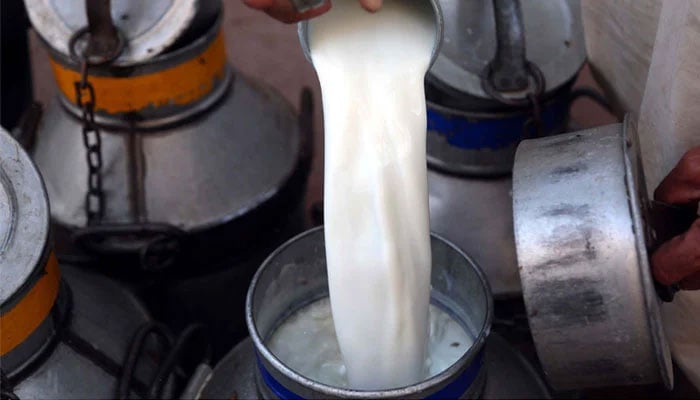93pc of milk in KP found to be adulterated, harmful
Milk quality in Bannu division is reported to be 100 percent substandard and harmful to health
PESHAWAR: The Khyber Pakhtunkhwa Food Safety and Halal Food Authority (KPFSHFA) has released a shocking report revealing that 93 percent of the milk consumed in the province is adulterated, substandard and harmful to health. “This is the first time that the KP Food Authority has collected milk samples from all major cities and sent them to the Static Laboratory in Hayatabad, Peshawar, for analysis. Unfortunately, the results were not satisfactory. Action has been initiated under the supervision of senior officials of KP Food Authority,” an official of the KP Food Authority told The News.
Milk samples were collected in the first week of July from all the seven divisions of the province, including Peshawar, Mardan, Kohat, Dera Ismail Khan, Bannu, Malakand and the Hazara region.
The detailed lab report obtained by The News states that milk samples were collected from large milk dealers selling 500 liters of milk daily. The samples were transported to the state-of-the-art KPFSHFA Static Laboratory in Hayatabad within 24 hours, using clean and sanitised equipment to avoid contamination.
Of the 583 milk samples collected, 93 percent (541 samples) were found to be adulterated, substandard, and harmful to health. Only 7 percent (42 samples) were found satisfactory. During the 10-day special milk sampling and testing campaign, 26 teams, led by assistant directors of the KP Food Authority, participated.
The report highlighted that milk quality in Dera Ismail Khan, the hometown of the chief minister, governor, and IGP, was particularly substandard. Similarly, the milk quality in Bannu division was reported to be 100 percent substandard and harmful to health.
Most of the milk supplied to Dera Ismail Khan, Bannu, and other southern districts of the province comes from Dera Ghazi Khan in Punjab.
In other divisions, the report found that 94 percent of the milk samples in Peshawar were substandard, 87 percent in Mardan, 88 percent in Kohat, 97 percent in Malakand, and 84 percent in Hazara.
Officials noted that water adulteration increases massively in the summer season, suggesting that it would be better to conduct another survey in the winter season. Water adulteration above 8 percent was considered a failure. Chemicals were detected in 17 milk samples. Water was found in 417 samples, glucose in 106, formaldehyde in 17, fat deficiencies in 224, and protein and other mineral deficiencies in 488 samples.
The report also indicated that 18.18 percent of the samples contained dry milk powder, 15.7 percent contained sucrose, 4.1 percent contained salt, 2.91 percent contained formaldehyde and 1.3 percent contained sorbitol.
The authority has initiated punitive measures, sealing 20 dairy shops found selling 25 percent of the adulterated milk.
-
 Man Convicted After DNA Links Him To 20-year-old Rape Case
Man Convicted After DNA Links Him To 20-year-old Rape Case -
 Royal Expert Shares Update In Kate Middleton's Relationship With Princess Eugenie, Beatrice
Royal Expert Shares Update In Kate Middleton's Relationship With Princess Eugenie, Beatrice -
 Andrew Mountbatten-Windsor’s Leaves King Charles With No Choice: ‘Its’ Not Business As Usual’
Andrew Mountbatten-Windsor’s Leaves King Charles With No Choice: ‘Its’ Not Business As Usual’ -
 Dua Lipa Wishes Her 'always And Forever' Callum Turner Happy Birthday
Dua Lipa Wishes Her 'always And Forever' Callum Turner Happy Birthday -
 Police Dressed As Money Heist, Captain America Raid Mobile Theft At Carnival
Police Dressed As Money Heist, Captain America Raid Mobile Theft At Carnival -
 Winter Olympics 2026: Top Contenders Poised To Win Gold In Women’s Figure Skating
Winter Olympics 2026: Top Contenders Poised To Win Gold In Women’s Figure Skating -
 Inside The Moment King Charles Put Prince William In His Place For Speaking Against Andrew
Inside The Moment King Charles Put Prince William In His Place For Speaking Against Andrew -
 Will AI Take Your Job After Graduation? Here’s What Research Really Says
Will AI Take Your Job After Graduation? Here’s What Research Really Says -
 California Cop Accused Of Using Bogus 911 Calls To Reach Ex-partner
California Cop Accused Of Using Bogus 911 Calls To Reach Ex-partner -
 AI Film School Trains Hollywood's Next Generation Of Filmmakers
AI Film School Trains Hollywood's Next Generation Of Filmmakers -
 Royal Expert Claims Meghan Markle Is 'running Out Of Friends'
Royal Expert Claims Meghan Markle Is 'running Out Of Friends' -
 Bruno Mars' Valentine's Day Surprise Labelled 'classy Promo Move'
Bruno Mars' Valentine's Day Surprise Labelled 'classy Promo Move' -
 Ed Sheeran Shares His Trick Of Turning Bad Memories Into Happy Ones
Ed Sheeran Shares His Trick Of Turning Bad Memories Into Happy Ones -
 Teyana Taylor Reflects On Her Friendship With Julia Roberts
Teyana Taylor Reflects On Her Friendship With Julia Roberts -
 Bright Green Comet C/2024 E1 Nears Closest Approach Before Leaving Solar System
Bright Green Comet C/2024 E1 Nears Closest Approach Before Leaving Solar System -
 Meghan Markle Warns Prince Harry As Royal Family Lands In 'biggest Crises' Since Death Of Princess Diana
Meghan Markle Warns Prince Harry As Royal Family Lands In 'biggest Crises' Since Death Of Princess Diana




